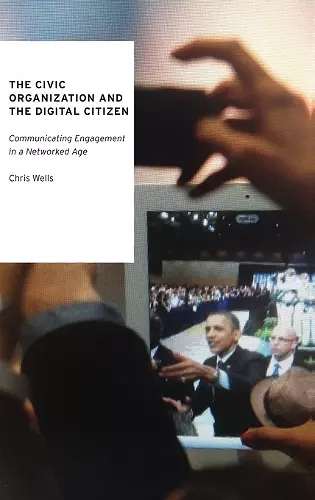The Civic Organization and the Digital Citizen
Communicating Engagement in a Networked Age
Format:Hardback
Publisher:Oxford University Press Inc
Published:20th Aug '15
Currently unavailable, and unfortunately no date known when it will be back
This hardback is available in another edition too:
- Paperback£29.99(9780190203627)

The powerful potential of digital media to engage citizens in political actions has now crossed our news screens many times. But scholarly focus has tended to be on "networked," anti-institutional forms of collective action, to the neglect of advocacy and service organizations. This book investigates the changing fortunes of the citizen-civil society relationship by exploring how social changes and innovations in communication technology are transforming the information expectations and preferences of many citizens, especially young citizens. In doing so, it is the first work to bring together theories of civic identity change with research on civic organizations. Specifically, it argues that a shift in "information styles" may help to explain the disjuncture felt by many young people when it comes to institutional participation and politics. The book theorizes two paradigms of information style: a dutiful style, which was rooted in the society, communication system and citizen norms of the modern era, and an actualizing style, which constitutes the set of information practices and expectations of the young citizens of late modernity for whom interactive digital media are the norm. Hypothesizing that civil society institutions have difficulty adapting to the norms and practices of the actualizing information style, two empirical studies apply the dutiful/actualizing framework to innovative content analyses of organizations' online communications-on their websites, and through Facebook. Results demonstrate that with intriguing exceptions, most major civil society organizations use digital media more in line with dutiful information norms than actualizing ones: they tend to broadcast strategic messages to an audience of receivers, rather than encouraging participation or exchange among an active set of participants. The book concludes with a discussion of the tensions inherent in bureaucratic organizations trying to adapt to an actualizing information style, and recommendations for how they may more successfully do so.
"As we become enamored and disillusioned by the civic conditions of democracy first, and the promise newer technologies convey about reviving these conditions second, a natural question that follows is: After democracy, what? In The Civic Organization and the Digital Citizen: Communicating Engagement in a Networked Age, Chris Wells takes a look at what happens when citizens are confronted with civic norms that leave them wanting more out of democratic forms of organizations. Caught between forms of civic organization that they do not want to disrespect but they also want to deviate from, they find themselves reimagining in-between spaces for civic activity. And therein lies a home for an emerging modality of digital citizenship, outlined in this terrific new volume." -- Zizi Papacharissi, Professor and Head of Communication, University of Illinois at Chicago "This book places organizations squarely in the nexus among democratic norms, youth citizenship, and digital media. Wells makes a real contribution to our understanding of the tension within civic organizations between new and old cultures of communication and action, illuminating how a variety of organizations are responding in different ways to the changing media environment and the expectations of young citizens." -- Bruce Bimber, University of California, Santa Barbara "In his insightful and clear-headed book, Chris Wells shows that civic associations must develop new and better "communicative relationships" with citizens. He offers a powerful analytical framework and generates insights of great practical value for political leaders and civic associations." -- Peter Levine, Associate Dean for Research and Lincoln Filene Professor of Citizenship & Public Affairs, Jonathan M. Tisch College of Citizenship and Public Service, Tufts University "Can 'legacy' civic organizations adapt their communication strategies to connect more effectively with young people in the digital age? Can new forms of 'virtual' organizations that are more attuned to the civic identities and practices of the young be effective in the brick and mortar world of political and economic power? In The Civic Organization and the Digital Citizen Chris Wells provides empirically grounded and insightful answers to these questions - answers of great import to how we theorize, research, and practice democratic politics in the 21st century." -- Michael X. Delli Carpini Dean Annenberg School for Communication at the University of Pennsylvania
ISBN: 9780190203610
Dimensions: 163mm x 236mm x 15mm
Weight: 519g
272 pages